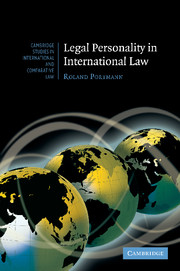Book contents
- Frontmatter
- Contents
- Foreword
- Acknowledgments
- Table of Cases
- List of Abbreviations
- Introduction
- Part I The concept of personality in international law
- Part II The conceptions of personality in international law: their origins and legal manifestations
- 4 Early doctrine and practice
- 5 The states-only conception
- 6 The recognition conception
- 7 The individualistic conception
- 8 The formal conception
- 9 The actor conception
- Part III A framework for personality in international law
- Bibliography
- Index
- Titles in the series
- References
9 - The actor conception
Published online by Cambridge University Press: 05 October 2010
- Frontmatter
- Contents
- Foreword
- Acknowledgments
- Table of Cases
- List of Abbreviations
- Introduction
- Part I The concept of personality in international law
- Part II The conceptions of personality in international law: their origins and legal manifestations
- 4 Early doctrine and practice
- 5 The states-only conception
- 6 The recognition conception
- 7 The individualistic conception
- 8 The formal conception
- 9 The actor conception
- Part III A framework for personality in international law
- Bibliography
- Index
- Titles in the series
- References
Summary
The actor conception of international personality considers all entities exercising ‘effective power’ in the international ‘decision-making process’ international persons. To be precise, the notion of international personality is avoided and the term ‘participant’ or indeed ‘actor’ preferred. It is not exactly argued that all participants are international persons because in principle the concept of international personality does not exist in this conception. However, there is often reference to the status of certain participants as ‘subjects of international law’ or ‘international persons’. And, functionally, the notion of participant is used to the same end as is the concept of international personality, namely, to describe which social entities are relevant in international law.
The actor conception is often associated with the work of Rosalyn Higgins, the President of the International Court of Justice. But while her work on the topic was certainly influential, she was not, and has never claimed to be, original in her statements on international personality. She mostly followed the path designated by Myers S. McDougal and Harold D. Lasswell (both from Yale Law School), who had formulated the actor conception after the end of World War II as part of their policy-oriented approach to international law. Later on, W. Michael Reisman joined McDougal and Lasswell in finalizing the conception and forcefully promoting it in theory and practice.
- Type
- Chapter
- Information
- Legal Personality in International Law , pp. 208 - 242Publisher: Cambridge University PressPrint publication year: 2010

